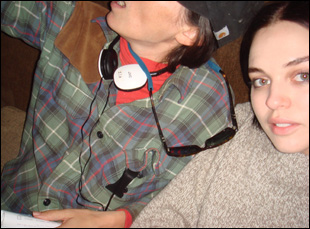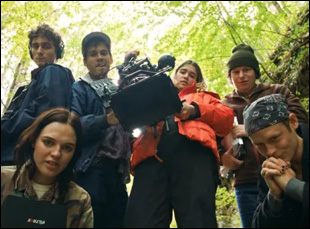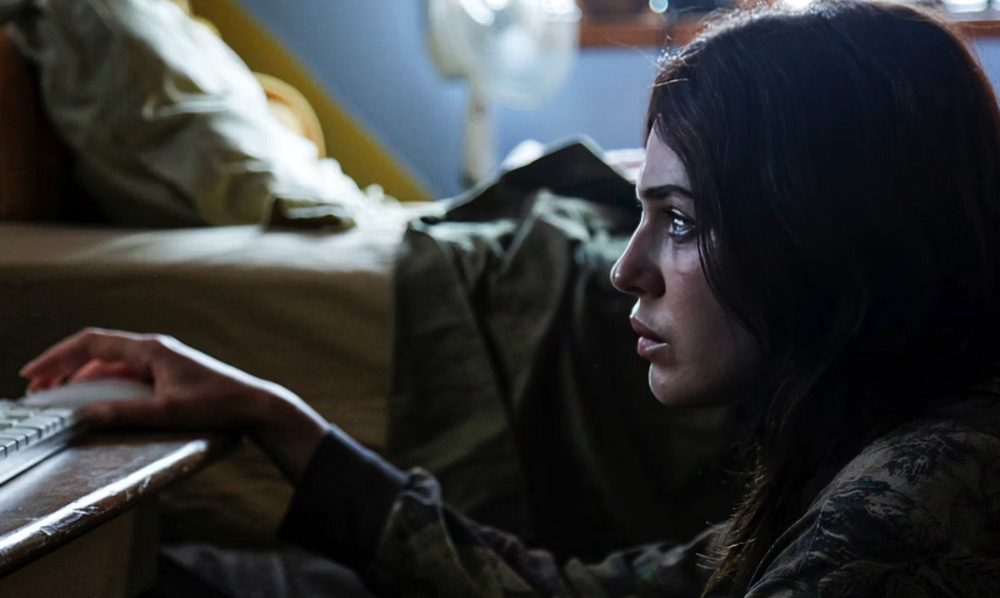Before a frame of “My First Film” even plays, it could be considered a triumph. Its director Zia Anger would’ve been forgiven for ever embarking on a feature again after the experience she had with the film she intended for her first, a project that few beyond its small cast and crew would’ve been aware of had it not somehow made it onto IMDb, even though it went unacknowledged by festival programmers that uniformly passed on it and Anger herself now sees as something of a folly. Still, something important happened to the artist and she wanted to find some way to share it with an audience even when she felt she had failed in the medium she invested so much into, so she found another forum where her creativity flourished in recounting how her first film went so wrong as an performance piece that could engross even if it didn’t have some fun interactive elements. (During the pandemic when she took the act online for a bit, it was a seamless — and fair — transition when people could put messages on the screen when prompted after the live performances when she would airdrop clips onto their phones.)
Without any of that background, however, “My First Film” would still play as a triumph when Anger clearly is such a talented filmmaker and her wisened perspective now joins a distinctive vision in recalling this particularly low moment in her life and career. Casting the fearless Odessa Young as her on-screen surrogate Zita, the director retraces her best laid plans to make a film about a young woman abandoned by her mother, only for the project itself to be labeled as “abandoned” on IMDb, which Anger worried would prevent her from being considered worthy of making another in others’ eyes. The story may be specific to Anger, but she depicts in unflinching detail a particular period of filmmaking in the late aughts to early 2010s where so many scrappy low-budget productions could be confused by its own cast and crew as either a creative endeavor or an excuse to hang, blurring any number of professional and personal lines on the set.
Zita is unaware of other boundaries when as a first-time director she wants to push the envelope, thinking she’s getting a deal by having a pilot fly around her lead actor for $50 per takeoff no matter how much it’ll rattle her nerves by how close he gets, and pushes herself with various medication to keep her energy up, but “My First Film” exposes how she could work against her own interests, attempting to create an egalitarian environment where she’d stress to everyone on set at the start of shoot days that they share authorship over what they’re making yet realizing how much of it falls on her shoulders to get her vision for the film across in the midst of production. It’s telling now that key collaborators such Billy Feldman, who co-wrote “My First Film,” and cinematographer Ashley Connor (“Madeline’s Madeline”) have come back from the original shoot to rejoin Anger on such an emotional excavation of what happened and while it’s a film that anyone aspiring to make movies should see, it becomes an especially fine example of what the form is capable of when Anger stretches its possibilities, mining the presentation she made on her laptop for its cinematic potential.
After carrying “My First Film” as a stage show around the world and an online event for the past few years, Anger is now unburdening herself of it to some degree as the movie version starts hitting theaters, beginning this weekend at the Roxy Cinema in New York and BrainDead Studios in Los Angeles before traveling even more broadly, and it was a real privilege recently to get to speak to the multimedia artist about how she regained the confidence to return behind the camera for a feature, what she could learn from the experience of performing “My First Film” initially in front of a live audience and her deep and fruitful collaborations with Young and Connor.

At a certain point, I knew while I was doing these performances. People would come up to me after and just say, “What a great story,” and I knew that was what you needed to make a film, so it stuck with me. Eventually I figured out what they meant by that, like “What story are they talking about?” And like everybody else, March 2020 happened, and I started to get unemployment checks and I [thought], “Hmm, I have all the time in the world, and this is like I’m getting paid by the government to write something.” I had already written a draft or two before then, but I asked Billy Feldman, who is the co-writer, to sit down with me and methodically dig into the script and write with me. We did that for a year, but it just really [felt] like, “We both have no other jobs and we’ve got to follow this story.”
I’m so glad to hear that something good came out of that time. And I wouldn’t claim to know Odessa, but I’ve talked to her a couple of times, so I know about how deep her engagement with directors generally is and given the self-reflective nature of this, what it was like to work with her on this?
It was a really, really amazing process. Odessa is just so talented and such a wonderful person. From the beginning, we just clicked. She started asking questions, and I started giving her answers. And we spent almost two months together before we filmed, with her wanting information and me wanting to workshop parts of the script and her being totally willing to go there with me, so by the time we were filming, it really just started to feel like we both shared the stakes of what this film was. And to watch her on set every day selflessly fall into this character and fearlessly try a lot of different techniques and have a lot of fun between takes was really meaningful to me as somebody who in the past had really, really, really wanted collaborators that were showing up with as much energy as I had. And she just did it. Watching her really taught me what is possible with an actor.
Was there anything that happened that you might not have expected but could get excited by when the film took on a life of its own?
Yeah, we shot it [more or less] in linear order, so as we get closer to the end of the film, it did really feel like — we would call it, the merge. It felt like I was with this familiar version of myself on set all the time, and I was just getting to look at this interesting version of myself [as we filmed scenes], but by the time we get to that, like, second-to-last scene where — this is a spoiler — but where we’re sitting across from each other and talk to each other, it didn’t feel manufactured at all. It felt like we had come from very far apart and slowly merged together and become this one thing that was so beyond Zia and so beyond Odessa as Vita, it was just its own thing. There’s no words for it, You get to see it, which is great.
You really do feel it. Did this actually involve retracing the steps of your first shoot and filming in some of the same locations? I wondered in particular with Airplane Andy, someone you called for your initial film to fly a plane for a shot – it seems like it might be impractical to call him again for this.
I did not want to recreate any of the incredibly dangerous things I did in the past, so we did call Airplane Andy to help us the day of shooting to secure the location — we scouted the same location that we had used the time before — and he helped us shut the road down and have the sheriff’s office come up [to corden off the shoot], but the actual plane in the movie is the original shot from the [first] movie that we reused. We were like, “How do we do this? Do we do CGI? Do we bring the plane in again?” And later on in the movie, you see some photos taken from the plane’s point of view, but that was just a consumer drone that we put up there [since] it was the safest way of doing it. It still included Airplane Andy, but it held none of the risk that the former movie had.

Ashley and I have always stayed close and continued to collaborate together. We’ve done a number of short films and music videos in between and it was really amazing because Ashley is such an established cinematographer at this point. She’s just a fucking boss. I trust her implicitly, explicitly — it’s like what the character Vita says [where] I actually do now trust her in this way that is she is also the author of this film completely. So when we finally got to work together with a proper budget and a really amazing crew, [which] was still small and felt ragtag — what was really cool is that Ashley just did her thing. I [didn’t say] “Shoot it this way or do that.” Every day Ashley just would pick the camera up, put it on her shoulder, and wouldn’t put it down for 12 hours and shot the exact film that she wanted to film. And it really feels like there’s no way to define where I end and she begins and where she ends and where I begin. That’s a really amazing accomplishment for us as friends, as collaborators and it’s totally the dream to just have somebody who you share a brain, a heart and soul with.
It is a beautiful collaboration, and this could be an editing question as much as a cinematography question, but formally when you did live performances of this beforehand, did it rearrange ideas about how you could engage an audience in terms of the visual language or the rhythm of storytelling?
Yeah, the performance really offered me a really great rhythmic roadmap to what I ended up ultimately making with my collaborators. It gave me a form and a structure — and I don’t want to talk in acts because I don’t really work in acts, but I understood what the prologue was and the wrong turns that the character needed to take to then get to the climax and overcome whatever she was overcoming. Doing this performance also helped give me a lot of energy as a director and a writer to really know what I could strive for ultimately in the edit in terms of the way I was thinking about the audience and what they could get out of it. Saying I’m doing a performance that’s about an old film I made is really going to give you a specific audience that wants to be there. It’s not for everybody. That audience is going to be incredibly engaged, and you’re going to learn a lot about what they understand and what they don’t.
What I found is that audiences are incredibly smart and incredibly adept at understanding really, really complicated things and many, many different timelines. They’re also really interested in poetry, which no one in the film industry is going to be like, “Yeah, let’s do poetry.” But poetry is everywhere. It’s all over the place. And obviously a lot of art is poetic, but I’m talking about capitalist filmmaking, and why shouldn’t it be there, too? So I really felt the permission to layer this story in a lot of different ways and what was really, really great is the two editors I worked with — Joe Bini and Matt Hannam — were both 100% there for the poetry and also were proper editors that really helped make sense of the film. They helped us lead the audience from world to world to world to world so that people could really not lose themselves to the complications of my own mind.
When the film is about putting yourself out there again after rejection, and this is clearly such an achievement, what’s it like to get this out into the world?
It’s honestly so exciting. I am really, really happy that people finally get to see this film and not just for myself but I really think that the work that my collaborators did, from the actors to the crew to Perfume Genius, who did the most amazing job on the score — [is] some of the best work of their lives and I am excited for people to watch it and see what I’ve been getting to see now for a number of years since I started working on this project.
“My First Film” will have special screenings in New York at the Roxy Cinema on August 30th, August 31st, September 1st and September 2nd and in Los Angeles on August 31st and September 1st at Braindead Studios and September 7th at Now Instant Image Hall. It will start to stream on MUBI on September 6th.




